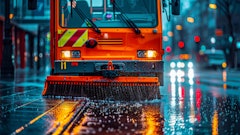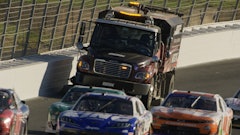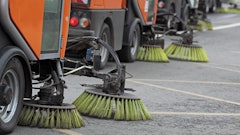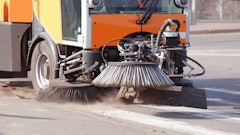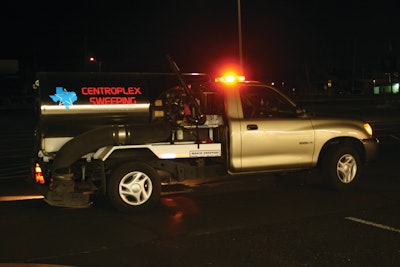
Parking lots may not seem like a dangerous place to most people, but for nighttime sweeper drivers, a dark, deserted parking lot can pose safety concerns. And concerns can be even greater if the parking lot is located in a bad part of town. For contract sweepers, concern for a driver?s personal safety is important, and a proactive effort should be made to keep nighttime drivers safe.
Although physical attacks don't appear to be frequent occurrences, there have been incidents where nighttime sweepers have been physically attacked, some even with weapons. Other situations drivers might find themselves encountering include break-ins and burglaries as well as vandalism.
Walsh Bentley, owner of Webco Sweeping in San Jose, CA, requires all of his drivers to go through a full training period which includes driving a route with an experienced sweeper before they can drive a sweeper alone. "This practice allows an employee to experience the unexpected while learning the correct way in which to respond to a myriad of situations," Bentley says.
Royal Sweeping and Paving, Houston, takes a different approach by always sending nighttime sweepers out in pairs, says one of the company's owners Kevin Kupfer. "We only have two person crews. They are always together so they feel safer, and that tends to help a lot," Kupfer says.
"If it's an area of town that is known for crime we encourage them not to leave each other's eyesight and stay together," Kupfer says. And if they feel in danger, he tells all his employees they should immediately leave the premises. "If they need to leave the premises we tell them not to worry about the job. The parking lot can be cleaned the next day," he says.
If a nighttime sweeping crew does feel unsafe and leaves a job, Royal Sweeping makes sure to contact the property manager the next day. "We let them know the particular issues with their property and any situation that may have occurred." As a result, Kupfer says some companies have added extra lighting or more security for their properties.
Alfred T. Lopez, owner of Centroplex Sweeping in Waco, TX, tells his drivers to always stay in their sweepers if they come across illegal activity. "Don't get out and try to be a hero," he says. Lopez tells his employees they should call the police right away. And if they don't feel safe staying there, they should move on to the next parking lot and come back after the police have taken care of the situation.
One practice for ensuring safety that many sweeping companies have in common is the use of reflective materials on clothing and trucks. "Our crew members that get out of the trucks wear safety vests. Our trucks are equipped with strobe lighting and all the lights on the equipment are always on," Kupfer says.
An added benefit to reflective clothing is if there is an incident while a driver is out of the truck, the reflective clothing makes it easier for people to see that employee. Lopez says it's also a good idea to have your company info "at least the name and phone number" on your sweepers in reflective material. "When the lights are off, people can see you on the parking lot," Lopez says. This is good for when the sweepers are in operation or if a sweeper is abandoned in a parking lot.
Another safety measure companies may employ is the use of cell phones. A cell phone has become a common item that most people own and carry with them. All Royal Sweeping's nighttime employees carry cell phones on the job, Kupfer says. "If one worker is off in a corner of the parking lot he or she can immediately talk to the other one," he adds.
Webco drivers are equipped with cell phones and two-way radios, Bentley says. This way they can immediately contact a manager or call 911 if there is any suspicious activity or safety concerns.
And Lopez makes sure that all Centroplex's employees have emergency phone numbers, like the police department and clients' security firms, programmed into their cell phones for easy access. Those emergency numbers are also kept in the sweepers for easy reference.
For many companies, keeping drivers safe starts even before they leave for a job. Royal Sweeping is one example. Before the start of the shift, Kupfer says he and the crews have a safety briefing where they discuss general safety issues as well as any specific ones drivers may have.
Royal Sweeping employs an on-call supervisor who drives around the city and meets the crew members on the job. "The supervisor is checking for quality and making sure the workers are safe. Plus, if sweepers are having tire problems, the supervisor always carries around extras tires to solve any of those problems on the job," Kupfer says.
Lopez also checks in on his nighttime employees to observe the work they are doing and make sure they are safe. But not every supervisor or owner can get to every parking lot his employees are on. "Make a route setup so you know where everyone is at all times," Lopez says. "If you know which parking lot they will be sweeping at a certain time you can go there and check on them."
Communication is key to safety, Kupfer says, and all contract sweepers should emphasize employee input on safety issues. Finding out what a driver needs on a job or the specific concerns he or she has is the first step to making sure employees feel safe. The next, and probably biggest step, is following through, Kupfer adds.
When it comes to keeping nighttime drivers safe, Lopez's best advice is to "use good old-fashioned common sense, and listen to your intuition."




![Pavement Awards 2025[main]](https://img.forconstructionpros.com/files/base/acbm/fcp/image/2024/05/PavementAwards_2025_main_.665883e4276e8.png?auto=format%2Ccompress&bg=fff&fill-color=fff&fit=fill&h=100&q=70&w=100)
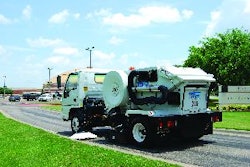
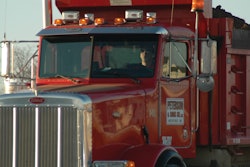
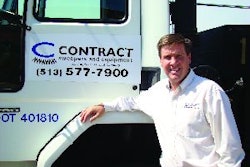





![Pavement Awards 2025[main]](https://img.forconstructionpros.com/files/base/acbm/fcp/image/2024/05/PavementAwards_2025_main_.665883e4276e8.png?ar=16%3A9&auto=format%2Ccompress&bg=fff&fill-color=fff&fit=fill&h=135&q=70&w=240)


